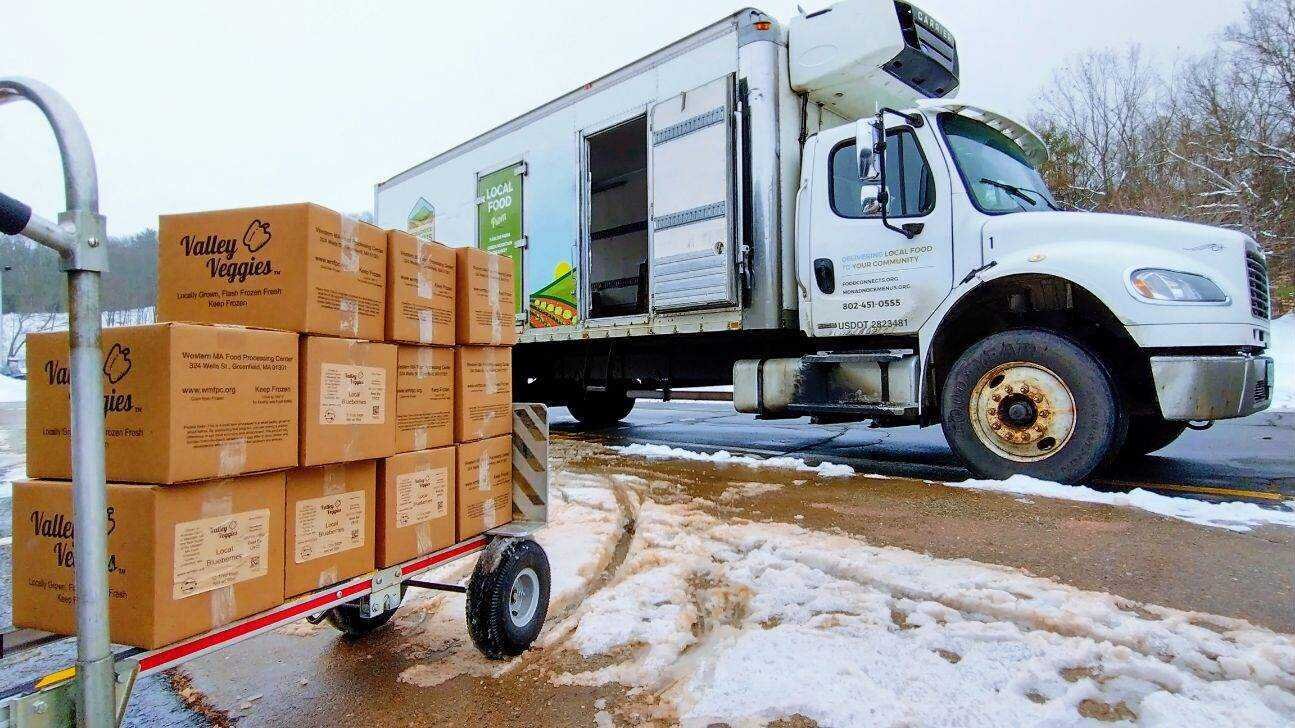Farm to School Cafe and Food Connects Feed Families Throughout the Holiday Season
Families in the Windham Northeast Supervisory Union (WNESU) received three free food boxes over the holiday break thanks to the tireless efforts of the Farm to School Cafe staff and farmers throughout the region. The food boxes contained a week’s worth of bulk meal ingredients for breakfast and lunch to help stretch families’ grocery budgets and keep students nourished over the long break. The Farm to School Cafe reached out to Food Connects to fill those boxes as much as possible with high-quality foods from local producers, including fresh NH-made bread, VT cheese and produce, and fresh fruit.
Thanks to numerous USDA waivers in response to COVID-19, universal free meals have been in effect nationwide since last March and schools have been operating under the Summer Food Service Program—which provides higher reimbursement rates per meal for schools. These two changes combined translate to easy to access meals for all students and a reliable revenue stream for school nutrition programs. The holiday food boxes extended that support through the break, all students qualified for this program—each family simply filled out a form for each student so the Farm to School Cafe team knew how much food to order.
“We were inspired by the Burlington School Food Project who blazed the trail on these meal kits,” says Harley Sterling, School Nutrition Director for the WNESU. “And grateful to the Vermont Agency of Education who has been incredibly supportive in developing this program.”
“Many students rely on school meal programs for both nutritious breakfasts and lunches each day during school,” says Conor Floyd, Food Connects Farm to School Program Manager. “When school is not in session, however, a gap in access to nutritious and filling food appears. Programs like the holiday food boxes allow all students in the supervisory union to have the same access to meals throughout school breaks, no matter their family’s income level.”
With increased meal flexibility as a result of the USDA waivers mentioned above, school nutrition programs have piloted new programs, including sending bulk ingredients home with students over extended breaks. These pilots often involve quick turnaround times and last-minute requests. Food Connects’ short supply chain and strong relationships with its producers helped the Farm to School Cafe access source-identified products from VT, NH, and MA on short notice.
"We're just thrilled that these universal meals programs allowed us to give kids and families in our community a little boost, especially this time of year,” says Sterling. “Making sure every kid has access to the great food grown and made in our area has always been our goal, and Food Connects makes it easy by letting us know what products are available and bringing them right to our kitchens."
With less than two weeks between the initial phone call from Sterling and the first delivery, the newly expanded Food Hub team sprang into action. The Food Connects Sales and Procurement Teams worked with Harley to brainstorm and source a variety of food products that:
families would eat but also inspire fun and new cooking ideas,
fell within the required price range,
were kid-friendly and easy for parents to cook, and
were hyper-local—the farthest items traveled only 87 miles while 7 of the 10 farms that provided food are located within 25 miles of Bellows Falls Union High School.
Once the orders were placed, the Food Connects Operations Team activated their network of dedicated drivers and expanded delivery fleet to pick up and deliver these orders—all while navigating their regular order and sales cycle to customers and capping off a record-breaking year in sales with Food Connects’ largest pre-Christmas delivery weeks ever. Although the Food Hub was closed for regular sales during the week of Christmas, the Food Hub staff generously volunteered to pick up extra shifts to ensure the orders made it to Bellows Falls Union High School in time for the Holiday Meal box distribution.
As the Farm to Cafe team kept families fed throughout the holiday season, they also bolstered the local food economy—buying food from 10 Food Connects farms and food producers: Basin Farm, Champlain Orchards, Dutton Berry Farm, Grafton Village Cheese, Green Mountain Orchards, Harlow Farm, Mi Tierra Tortillas, The Bread Shed, Valley Veg, and Yalla Vermont. Over $19,000 was spent at these local food businesses. “This is money that is going straight back into the community,” says McKenna Hayes, Food Connects Food Hub Co-Director, “being paid out to area producers and distribution staff, who in turn use those funds at other local businesses.”
So what did families actually receive? 2,100 pounds of potatoes, 852 quarts of yogurt, about 6,000 apples, 600 pints of cider, 180 bunches of kale, 1,100 loaves of bread, 600 bags of frozen blueberries, 1,416 pounds of carrots, 300 tubs of hummus, 400 blocks of cheese, and 300 tortilla packets.
Every box contained food as well as ideas for how to use it—providing students and families with educational tools to make easy, wholesome meals. “We sent out little educational activity sheets with simple recipes that anyone can do with just water and a microwave,” says Sterling. “From kale chips and cheese ("Mayan sandwich") quesadillas to baked potatoes and English muffin pizzas.”
“This is a great example of how our organization can collaboratively problem-solve to help our community,” says Hayes. “Harley relied on his partnership with our Farm to School and Food Hub teams and we leveraged our community-based networks and short supply chains to respond to the request quickly. It truly shows the successful ability to pivot school lunch services in the COVID-19 era.”




